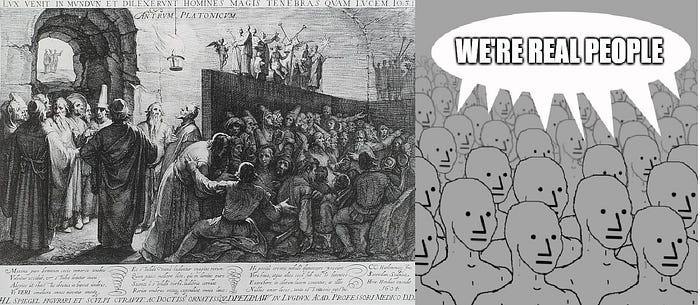I Made Fun Of A Girl Whose Mother Was Murdered
There’s a reason we’re all mean to each other, and it isn’t completely linked to politics
Do you ever have vague recollections from childhood? Maybe a street where you played? Or the face of a young friend? A few years ago, I had one of those instances.
I remembered a blonde little girl that lived on my street. We were in the same grade. So, sometimes we’d play together after school, and many times walked each other home. I don’t remember her name, but her face is etched in my memory now.
She always smiled. Although that’s not what stands out, or the color of her hair. It’s the way she disappeared from my life, and the circumstances around it. In fact, I consider it odd she slipped my mind.
When we played together, I remember seeing her mom. Not her features. Just something about her was off-putting, even to my childhood brain. Although this passed out of my head.
You don’t know enough at that age to understand adult-level warning signs. I was seven or eight years old.
Then, out of the blue, she wasn’t in school anymore. After a week, an answer finally appeared. One which didn’t make any sense to my underdeveloped brain.
Her mother had been murdered. Shockingly, by a neighbor of ours who’d we chat with on a regular basis. And it gets worse.
I don’t know what police procedures were like back then, or if somehow details from the crime scene leaked out. But it was gruesome. He hadn’t only killed her but chopped all her fingers off.
Everyone knew about it, including the kids in my classroom. So, it became our topic of discussion, and being kids, we dealt with it in our own way. Which was to make fun of it.
In a way only terrible children could, we connected the murder to a Ginsu knife commercial on television. We giggled as we said, “X’s mom was sliced and diced!” You’d think I’d have known better. But no. Of course, I got in on the fun and happily added my voice to the chorus.
Now, that’s what continuously sticks in my head.
Although it was a long time ago, and certain things are fuzzy, I remember that unfortunate girl being my friend. Yet, there was this odd detachment where I took a callous shot at her.
In the end, she never came back to our school, and that was probably the best thing that could have happened. It wasn’t enough that she lost her mom, but would come to school knowing everyone else around her knew about the gruesome death.
Since this all came back to me, the murder doesn’t stand out in my memory. It’s the classroom’s reaction. How could we be so terrible? How could I join in? The whole event really made me think everything out.
After time, an answer came to me. It was the anonymity.
As a group, we never looked into her face. Never saw tears in her eyes. There was no visible reaction or any kind of feedback equivalent to the event, which could clue us in on how to properly react.
How could we understand the magnitude of a parent being murdered at our age? It was foreign. The news brought into our classroom might as well have been the synopsis of a movie. It was just as distant as that.
I made fun of my friend’s suffering…because I couldn’t see her suffering. I also later learned things about her mom. She was off-putting for a reason. I’ll leave it at that. So, that little girl’s smile hid a terrible world.
However, it could never enter into mine because her pain was never evident to me — before or after the murder. I could never look into her eyes and see it. Again, it was anonymous.
Then, I had another realization. The same anonymity is why we’re so mean to each other as a society, particularly today.
According to Marriam Webster an avatar is “an electronic image that represents and may be manipulated by a computer user (as in a game).”
It’s something we’re very familiar with since 82% of Americans have a social media profile. While almost half have worked remotely full or part-time since the pandemic. Not to mention most text more than they talk on their phones.
We’re spending more time interacting with avatars, instead of real people. So, there’s increased anonymity. It inevitably influences how you treat others when you really can’t see them.
Dr. Mariana Plata at Psychology Today says, “The anonymity factor contributes to online rudeness and trolls.” She also notes a study done by the University of Haifa in Israel which shows a lack of eye contact is “the chief contributor to the negative effects of online disinhibition.”
But it goes a step further when you look at a popular meme that went around the internet. Look up NPC. It stands for “non player character.” Those are the computer-generated characters in video games that repeat the same lines. They’re not real.
The meme states certain people are NPCs, because they have no original thoughts. They only spout what they’re fed, like a program. They’re fake.
Now, add into this the other popular thought experiment asking whether life is just a computer simulation, like The Matrix. That’s not a conspiracy theorist tossing that about; it’s being discussed in the magazine Scientific American.
So, we’re surrounded by NPCs and avatars — with no feelings or lifeforce — within a fake world.
It’s no wonder we’re becoming adult versions of that classroom which thought nothing about ripping that kid to shreds because she wasn’t there.
Now, transfer this idea to a massive city, where you do see faces but most are unrecognizable. They might as well be NPCs.

Thousands of years ago, Plato wrote the cave allegory, about prisoners locked in a cell that could only see shadows created for them. But for the cave dwellers, the shadows were real. The philosopher claimed there was only one way to see the truth: step out into the light.
Although Plato warns the process is painful. Shadows are easier to deal with, and this leads us to our present time.
We’re continually reminded we’re in politically divided times. Often this is used as an explanation for the “online rudeness,” or general meanness we’re continually greeted with everywhere we go. But is that really the answer?
I think it’s the anonymity, and a great writer can explain why.
Acclaimed historian Will Durant traveled the world and wrote thirty books, spending over sixty years writing about history and philosophy. He also visited the places in his books and saw many monumental events in history himself.
He’s personally so influential to me I even named this blog after a comment he wrote in one of his books, “History is philosophy in action.”
Durant changed much with the times and doesn’t fit neatly into a box.
As a child he trained for the priesthood, as a young man he became a radical Marxist-atheist, then in later adulthood he rebelled against this seeing the benefits of the free market and religion. Similarly, he says history is complex and this leads to problems.
In The Lessons of History, he sums it up this way:
“History as is usually written is quite different from history as usually lived. The historian records the exceptional because it is interesting.”
Durant says most of history is made of parents raising children, people going to work every day, and boring things. So, writers catalog the interesting. Therefore, history must be looked at as a long whole.
For instance, most explain the story of powered-flight with the Wright Brothers. In Fallen Leaves, Durant claims it’s really a three-thousand year long tale. It begins with Icarus and the Greeks thinking of flight. Then, it continues with Da Vinci sketching and creating flying machines.

Only with all this inspiration and countless faceless creators doing legwork, do a couple brothers in Ohio stand on their shoulders, creating a machine that works. How do you compress that into an avatar?
It would be like trying to compress someone as complex as Durant into one. Or someone as complex as you or me.
When you compress, you lose detail, and when you compress the complexness of a person into an avatar, you lose humanity. It’s much easier to be cruel to a caricature.
That’s how you get a classroom of children making fun of a girl whose mother was murdered.
That’s how you get cities with rampant crime.
That’s how you get the crap-show of social media with its armies of trolls willing to rip people apart for sport.
Durant could make out the complexities of history because he sought it out first-hand. Like Plato said, he stepped into the light. This changed him.
The only way to deal with our avatar problem is to work to meet them personally, or at least see them as more than their compressed image.
Otherwise, we’re all capable of being the kids in that classroom. I know it personally.
-Originally posted on Medium 12/30/22



